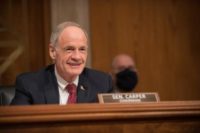Senate commerce committee leaders have rolled out a Federal Aviation Administration reauthorization bill that would increase airport construction grants but leave untouched the cap on passenger facility charges, another important airport infrastructure funding resource.
The new bill, which committee Chairman John Thune (R-S.D.) and the panel’s top Democrat, Bill Nelson (Fla.), unveiled on March 9 [summary], differs in important ways from the version that House Transportation and Infrastructure Committee Chairman Bill Shuster (R-Pa.) moved through his committee on Feb. 11.
The Senate measure spans 18 months and is bipartisan; Shuster’s extends for six years and has run into strong criticism from Democrats on his panel and some in the aviation industry, chiefly over a provision to spin off FAA’s air traffic control operations into a nonfederal, nonprofit corporation.
The Thune-Nelson Senate version, which is scheduled for a commerce committee vote on March 16, keeps the FAA’s air traffic control unit within the FAA.
In the wake of criticism over the ATC provision in Shuster’s proposal, House Republican leaders in late February put off a floor vote on the legislation.
Congress must reauthorize FAA programs, if even for a short period, by March 31 when a current stopgap measure lapses.
For the construction industry, the major focus in the bills is their funding for FAA’s Airport Improvement Program (AIP) construction grants. The Thune-Nelson proposal would raise AIP’s authorization by $400 million, or 12%, in 2017, to a total of $3.75 billion.
The House transportation panel version would provide $22.7 billion over six years for AIP, with the 2017 level set at $3.6 billion. The funding would top out at slightly less than $4 billion in 2022.
Airport officials were disappointed that the Senate bill doesn’t boost the PFC cap from the current $4.50, a level that was set in 2000. Shuster’s bill also leaves the ceiling where it is.
Airports Council International-North America CEO Kevin Burke and American Association of Airport Executives CEO Todd Hauptli called the Senate measure’s lack of a PFC increase “unfortunate.”
They added, “The modest proposed increase in federal investment for airport infrastructure [in AIP] is welcomed, but [the Senate] legislation is a missed opportunity to make progress in promoting airline competition and getting Washington out of the way of local airport investment decisions by modernizing the local PFC user fee.”
Shuster, in a statement, praised the senators for introducing their bill. He noted that his committee and the Senate’s have worked together on a surface transportation, Amtrak and other bills that have become law.
He added, “I look forward to continuing our work and building upon our previous successes by completing an FAA bill that provides critical reforms for the FAA and the nation’s aviation system.” The last part of that statement indicates that he doesn’t want to see a status quo FAA.
For his part, U.S. Transportation Anthony Foxx issued a short statement commending Thune and Nelson “for putting together a bipartisan proposal to reauthorize the FAA.” Foxx added, “I look forward to examining the details of their bill.”



Post a comment to this article
Report Abusive Comment